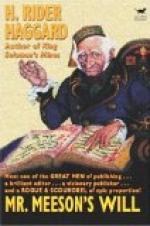“And now, my dear Miss Smithers,” said Lady Holmhurst when, dinner being over, they were sitting together in the moonlight, near the wheel, “perhaps you will tell me why you don’t like Mr. Meeson, whom, by-the-way, I personally detest. But don’t, if you don’t wish to, you know.”
But Augusta did wish to, and then and there she unfolded her whole sad story into her new-found friend’s sympathetic ear; and glad enough the poor girl was to find a confidant to whom she could unbosom her sorrows.
“Well, upon my word!” said Lady Holmhurst, when she had listened with tears in her eyes to the history of poor little Jeannie’s death, “upon my word, of all the brutes I ever heard of, I think that this publisher of yours is the worst! I will cut him, and get my husband to cut him too. But no, I have a better plan than that. He shall tear up that agreement, so sure as my name is Bessie Holmhurst; he shall tear it up, or—or”—and she nodded her little head with an air of infinite wisdom.
CHAPTER VI.
MR. TOMBEY GOES FORWARD.
From that day forward, the voyage on the Kangaroo was, until the last dread catastrophe, a very happy one for Augusta. Lord and Lady Holmhurst made much of her, and all the rest of the first-class passengers followed suit, and soon she found herself the most popular character on board. The two copies of her book that there were on the ship were passed on from hand to hand till they would hardly hang together, and, really, at last she got quite tired of hearing of her own creations. But this was not all; Augusta was, it will be remembered, an exceedingly pretty woman, and melancholy as the fact may seem, it still remains a fact that a pretty woman is in the eyes of most people a more interesting object than a man, or than a lady, who is not “built that way.” Thus it came to pass that what between her youth, her beauty, her talent, and her misfortunes—for Lady Holmhurst had not exactly kept that history to herself—Augusta was all of a sudden elevated into the position of a perfect heroine. It really almost frightened the poor girl, who had been accustomed to nothing but sorrow, ill-treatment and grinding poverty, to suddenly find herself in this strange position, with every man on board that great vessel at her beck and call. But she was human, and therefore, of course she enjoyed it. It is something when one has been wandering for hour after hour in the wet and melancholy night, suddenly to see the fair dawn breaking and burning overhead, and to know that the worst is over, for now there will be light whereby to set our feet. It is something, too, to the most Christian soul, to utterly and completely triumph over one who had done all in his power to crush and destroy you; whose grasping greed has indirectly been the cause of the death of the person you loved best in the whole world round. And she did triumph. As Mr. Meeson’s conduct to her got about, the




